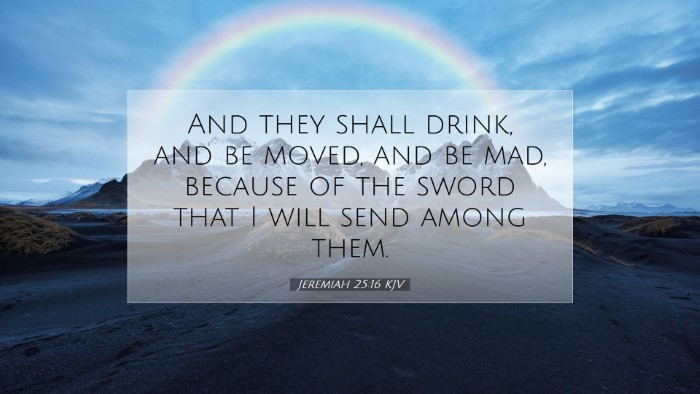Bible Commentary on Jeremiah 25:16
Jeremiah 25:16: "And they shall drink, and be moved, and be mad, because of the sword that I will send among them."
Introduction
The prophetic words delivered by Jeremiah in this verse capture a critical juncture in the history of Israel, highlighting God's impending judgment due to their transgressions. This commentary synthesizes insights from several public domain sources, including Matthew Henry, Albert Barnes, and Adam Clarke, providing a comprehensive exploration of the verse's theological implications and practical applications.
Contextual Background
Jeremiah, known as the weeping prophet, labored in tumultuous times leading up to the Babylonian exile. His prophecies often revealed God's displeasure over the idolatry and unfaithfulness of His people. The broader context of Jeremiah 25 involves God's warning through Jeremiah about the coming destruction and a call to repentance.
Historical Context
- The Kingdom of Judah: By the time of this prophecy, Judah was entrenched in sin, engaging in idolatry and social injustices.
- Jeremiah's Ministry: Jeremiah's ministry spanned approximately forty years, making his warnings significant for understanding God's judgment.
- The Role of Babylon: The prophecy also foreshadows the rise of Babylon as an instrument of divine judgment against Judah.
Thematic Insights
The verse encapsulates several key themes that merit further examination:
Divine Judgment
According to Matthew Henry, the phrase "they shall drink" indicates a metaphorical consumption of God's wrath, suggesting that the people will be inundated with the consequences of their actions. This drinking leads to a state of confusion and madness, ultimately aligning with God’s purpose of bringing about repentance through drastic measures.
Spiritual Madness
Albert Barnes expounds on the impact of divine judgment, stating that the effects of God's wrath will leave a profound psychological effect on the people. The sense of being “moved” relates to both a literal and spiritual destabilization, resulting in madness. The people’s response reflects the debilitating nature of sin, which, when unrepented, leads to despair.
The Sword of Judgment
Jeremiah's reference to “the sword that I will send among them” speaks to the violence and destruction that judgment entails. Adam Clarke highlights that the sword is a symbol of warfare and divine discipline, emphasizing that such destruction stemmed from the people's choice to abandon God's commandments. Clarke underscores that God's patience has limits, and the ensuing judgment is part of His holy justice.
Theological Reflections
This verse invites several theological reflections that are pertinent for pastors, theologians, and scholars:
God's Sovereignty
The verse strongly affirms God's sovereignty in history. Despite the chaos of human actions, God orchestrates events in accordance with His purposes. As seen in Jeremiah's prophecies, God's judgment serves as a warning, imparting significant lessons about fidelity and obedience to divine law.
The Nature of Sin
Sins have consequences. The fallout of Judah’s idolatry and rebellion underscores the seriousness of sin, urging readers to take heed. As Matthew Henry notes, the consequences of turning away from God not only affect individuals but can lead to national calamity.
Call to Repentance
This passage serves as an implicit invitation to repent. There is a clear pattern in Scripture that highlights God's willingness to forgive; however, unrepentant hearts will face the repercussions of divine wrath. Albert Barnes emphasizes that hope remains for those who turn back to God before judgment fully manifests.
Practical Applications
For modern readers, Jeremiah 25:16 holds profound truths that resonate across generations:
Understanding Divine Justice
In today's context, understanding God's justice is crucial. It reminds believers of the need for alignment with God's will and living in a manner that reflects His holiness.
Emphasizing Discipleship
The passage encourages discipleship as a proactive response to God's truths. Engaging with scripture and participating in community can help believers navigate the complexities of faith in a challenging world.
Hope amid Judgment
Even amidst messages of judgment, the theme of hope prevails in God’s ultimate plan for redemption. Adam Clarke reminds readers that turning back to God can restore relationship and peace, despite the turmoil of personal or corporate sin.
Conclusion
Jeremiah 25:16 presents a sobering reflection of God's judgment while inviting genuine introspection and repentance. The combined insights from Matthew Henry, Albert Barnes, and Adam Clarke illustrate that, in the chaos of human frailty and sin, God's sovereign hand remains over the affairs of men, calling us to return to Him with all our hearts.


